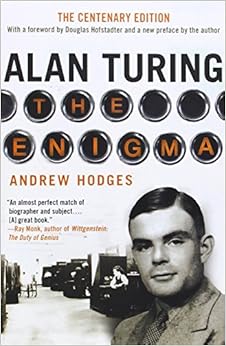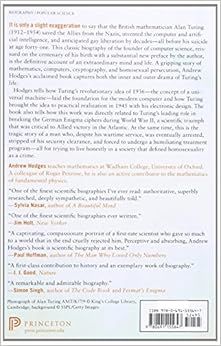Amazon.com Review
Alan Turing died in 1954, but the themes of his life epitomize the turn of the millennium. A pure mathematician from a tradition that prided itself on its impracticality, Turing laid the foundations for modern computer science, writes Andrew Hodges:
Alan had proved that there was no "miraculous machine" that could solve all mathematical problems, but in the process he had discovered something almost equally miraculous, the idea of a universal machine that could take over the work of any machine.
During World War II, Turing was the intellectual star of Bletchley Park, the secret British cryptography unit. His work cracking the German's Enigma machine code was, in many ways, the first triumph of computer science. And Turing died because his identity as a homosexual was incompatible with cold-war ideas of security, implemented with machines and remorseless logic: "It was his own invention, and it killed the goose that laid the golden eggs."
Andrew Hodges's remarkable insight weaves Turing's mathematical and computer work with his personal life to produce one of the best biographies of our time, and the basis of the Derek Jacobi movie Breaking the Code. Hodges has the mathematical knowledge to explain the intellectual significance of Turing's work, while never losing sight of the human and social picture:
In this sense his life belied his work, for it could not be contained by the discrete state machine. At every stage his life raised questions about the connection (or lack of it) between the mind and the body, thought and action, intelligence and operations, science and society, the individual and history.
And Hodges admits what all biographers know, but few admit, about their subjects: "his inner code remains unbroken." Alan Turing is still an enigma. --Mary Ellen Curtin
--This text refers to an out of print or unavailable edition of this title.
Review
"One of the finest scientific biographies ever written."--
Jim Holt, New Yorker"Andrew Hodges' 1983 book
Alan Turing: The Enigma, is the indispensable guide to Turing's life and work and one of the finest biographies of a scientific genius ever written."--
Michael Hiltzik, Los Angeles Times"Turing's rehabilitation from over a quarter-century's embarrassed silence was largely the result of Andrew Hodges's superb biography,
Alan Turing: The Enigma (1983; reissued with a new introduction in 2012). Hodges examined available primary sources and interviewed surviving witnesses to elucidate Turing's multiple dimensions. A mathematician, Hodges ably explained Turing's intellectual accomplishments with insight, and situated them within their wider historical contexts. He also empathetically explored the centrality of Turing's sexual identity to his thought and life in a persuasive rather than reductive way . . ."--
Michael Saler, Times Literary Supplement"On the face of it, a richly detailed 500-page biography of a mathematical genius and analysis of his ideas, might seem a daunting proposition. But fellow mathematician and author Hodges has acutely clear and often extremely moving insight into the humanity behind the leaping genius that helped to crack the Germans' Enigma codes during World War II and bring about the dawn of the computer age. . . . This melancholy story is transfigured into something else: an exploration of the relationship between machines and the soul and a full-throated celebration of Turing's brilliance, unselfconscious quirkiness and bravery in a hostile age."--
Sinclair McKay, Wall Street Journal"A first-class contribution to history and an exemplary work of biography."--
I. J. Good, Nature"An almost perfect match of biographer and subject. . . . [A] great book."--
Ray Monk, Guardian"A superb biography. . . . Written by a mathematician, it describes in plain language Turing's work on the foundations of computer science and how he broke the Germans' Enigma code in the Second World War. The subtle depiction of class rivalries, personal relationships, and Turing's tragic end are worthy of a novel. But this was a real person. Hodges describes the man, and the science that fascinated him--which once saved, and still influences, our lives."--
Margaret Boden, New Scientist"Andrew Hodges's magisterial
Alan Turing: The Enigma . . . is still the definitive text."--
Joshua Cohen, Harper's"Andrew Hodges's biography is a meticulously researched and written account detailing every aspect of Turing's life. . . . This account of Turing's life is a definitive scholarly work, rich in primary source documentation and small-grained historical detail."--
Mathematics Teacher







